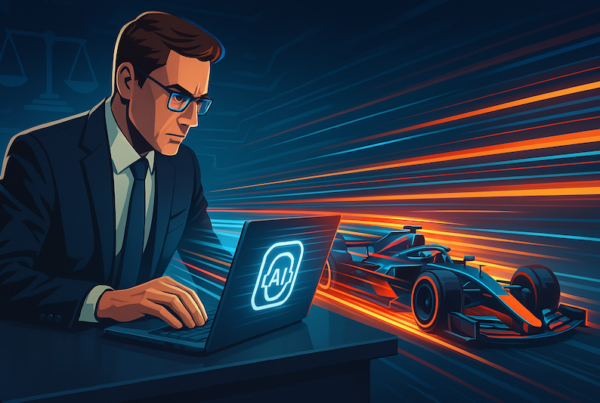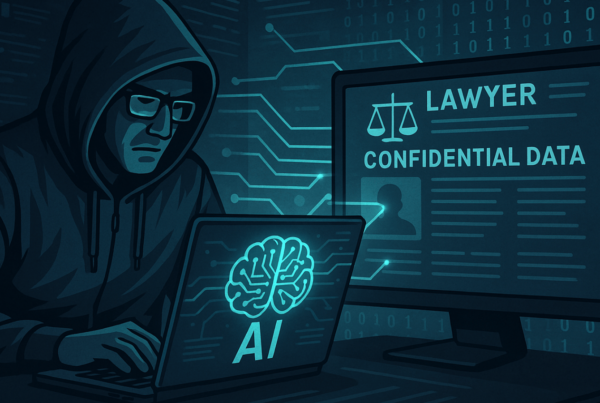Let’s talk about “digital knowledge work” and the new problems it‘s foist upon us lawyers.
First, some quick background…
Knowledge Work 101
I’ve explained before, lawyers should think of themselves as “knowledge workers” (a term first coined by the well-known management guru Peter Drucker in the late 1950s).
When Drucker came up with the term, it mostly referred to people who worked in offices — like in the TV show Mad Men for example. Anyway…
The crux of “knowledge work” is thinking, and solving thorny problems by thinking. But, not every knowledge worker engages in high level problem solving.
For example…
In traditional offices a lot of knowledge workers did lowly clerical work (for lowly salaries).
Some did management work (for higher salaries). And consider this…
It was easy to see who was doing clerical work and who was doing management work.
Because the clerical folk were doing most of the paper pushing. BUT…
That’s started to change in ways that are pretty interesting.
The Rise of DKW
Once the computer came to dominate our office life, we began to see the rise of the digital knowledge worker. And here’s the interesting thing that started to happen.
It became harder to tell the clerical folk from the management folk simply by looking at them doing their work.
For one, because ”papers” disappeared and were replaced by computers.
Digital documents became dominant and (this is the interesting part) management workers began doing their own clerical work. Because…why not?
Computers made it super easy to copy, save, transmit files. High level knowledge workers started thinking in weird new ways. They thought…
“It’s faster to do a lot of this admin work myself so why ask someone else to do it?“
After The Rise comes The Fall
More management level knowledge workers started typing on keyboards: sending emails, entering time records, editing documents, surfing the web, wasting time on Facebook etc.
This might not have seemed like a big deal at first. But now it’s an insidious problem. For a lot of people.
Especially lawyers in small firms. Or solo lawyers. And so…
Lawyers are now bogged down with what I call “digital drudgery.”
Meaning: the clerical stuff that office staff used to handle.
Clerical Drudgery
Scroll through the list below. I’ll bet you do a lot of these tasks yourself.
After you finish scrolling (which will probably take you awhile) I’ll discuss how to STOP doing this kind of work. Ready? Okay…
Start Scrolling
- Filling out forms
- Preparing bills
- Answering routine questions by email or phone
- Keeping track of case progression
- Bookkeeping work
- Trust accounting
- Preparing routine legal documents
- Keeping clients updated on case status
- Scheduling appointments
- Scheduling conferences
- Doing legal research
- Sending out bills
- Following up to get bills paid
- Taking notes in meetings
- Handling inquiries from prospective clients
- Setting up initial consultations
- Getting engagement agreements signed
- Gathering documents from clients
- Keeping track of important deadlines
- Managing staff and motivating them to do the work
- Handling payroll
- Keeping track of referrals
- Sending thank you notes to referral partners
- Sending gifts to top referral partners
- Writing articles for marketing purposes
- Sending marketing emails
- Paying dues to bar associations
- Drafting documents and formatting them
- Ordering supplies
- Troubleshooting tech problems
- Setting up new computers and tech equipment
- Searching for general information when needed
- Organizing digital documents
- Sending documents to people
- Making sure data is secure from hackers and ransomware
- Keeping track of passwords
- Keeping track of login credentials
- Keeping track of software serial numbers
- Hiring consultants to help with technology, marketing and business operations
- Learning to use new software
- Learning to use old software better
- Notarizing documents
- Paying bills online…
Clearly, We Have a Problem
Weren’t computers supposed to make your life easier? How did things get so out of whack?
Who knows? But, I think we can agree we have a problem.
Lawyers should not be doing this kind of clerical work.
Not even lawyers who are enthralled with computers. And definitely not lawyers in solo or small firm practices.
So, what’s the solution?
Well, having studied this phenomenon for a long time, as far as I can see, the only way out is to do something radicallydifferent.
Tweaking is not the answer.
I mean, getting a better task management app will only get you so far, right?
So here’s my radical proposal: upgrade your working habits for the Digital Age. In other words, learn to…
Work Smarter
The key to doing this is optimizing your time and efforts for the highest value work, not the low value stuff.
Stop doing clerical work! Period.
Automation is one way to optimize. Outsourcing is another.
But understand that this optimizing takes time to learn and execute. And even if you get the automating and outsourcing optimized…
Those are just TWO (2) components out of several.
Those are just PARTS of a significant project that needs to be managed effectively across all levels.
And the project I’m talking about?
It’s managing your law practice —i.e. your law business.
Your law business needs to be managed so that technology helps you get more things done more easily.
Look, here’s the simple truth…
Managing projects in the Digital Age require new management skills. It requires a new approach your digital knowledge work.
Peter Drucker can’t help us with this anymore. He’s long gone.
And, unfortunately, it doesn’t seem like anyone else has good advice on how to do digital knowledge work. Certainly not for lawyers.
This puzzled me. To the point that, after thinking about this for several years…
Bottom Line
You should stop doing clerical work (even if you are adept with computers) and focus more on higher level work that’s more interesting, and more lucrative.
That’s the key to creating a better, happier law practice.
Think about it and see if it makes sense.
Hopefully it does.
General Resources
- Check out my Inner Circle (to participate in ongoing discussions about tech tools I discuss and recommend)
- Check out this Law-Tech Assessment if you want specific recommendations for improving based on the technology you’re using in your practice
- Click for a list of the Best Tech Tools for Lawyers
- Subscribe to: The 80/20 Principle newsletter (it’s free)
Use technology to radically improve your law practice by focusing on the few core elements that have the biggest impact.






